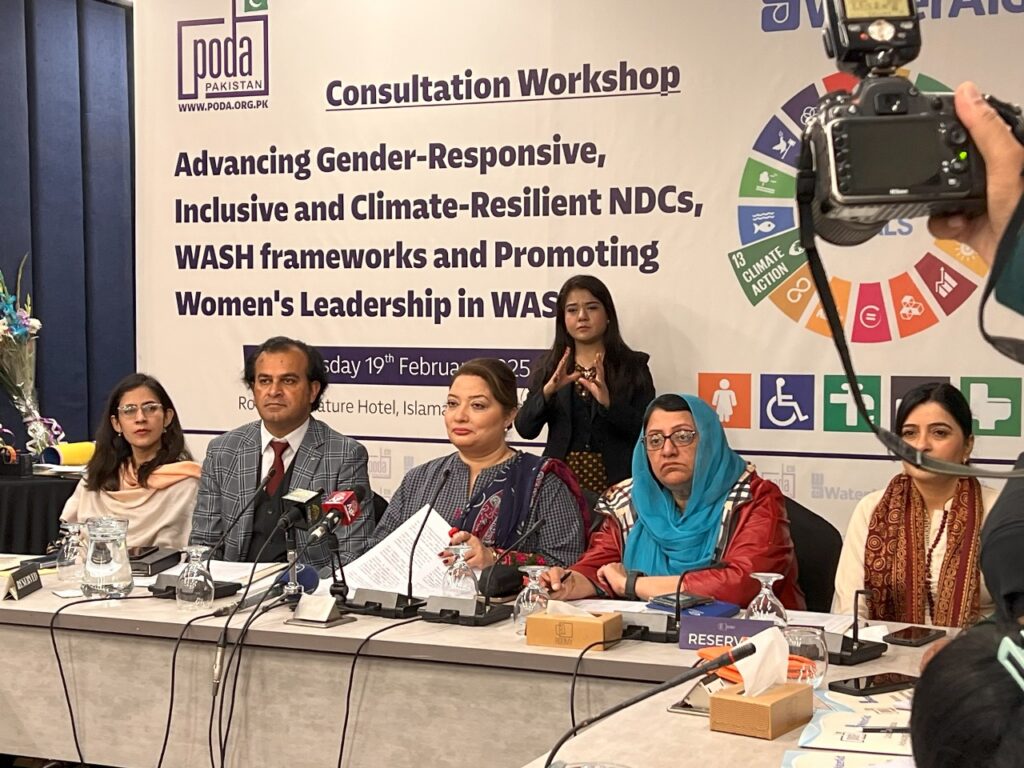

February 19, 2025 / Reporter
Experts Call for Gender-Responsive Water Policies
Islamabad: Coordinator to the Prime Minister on Climate Change, Romina Khurshid Alam has called for the development of inclusive climate strategies that prioritize the involvement of women, girls, transgender individuals, and Persons with Disabilities (PWDs) in climate change mitigation efforts for environmental sustainability.
Ms. Romina addressed participants at a consultation workshop on “Advancing Gender-Responsive, Inclusive, and Climate-Resilient Nationally Determined Contributions (NDCs),” where she highlighted Pakistan’s significant climate vulnerability and its disproportionate impact on women and marginalized communities.
The event was organized by WaterAid Pakistan, a programme for sustainable water, sanitation, and hygiene, and Potohar Organization for Development Advocacy (PODA), a network advocating for the rights of rural women.
She explained that although Pakistan contributes less than 1% of global carbon emissions, it faces some of the most severe consequences of the climate crisis. The 2022 floods, which caused damage exceeding 24 billion PKR, serve as a stark reminder of the devastating impacts of extreme weather events on infrastructure, livelihoods, and vulnerable communities, particularly women, girls, transgender individuals, and PWDs.
“Women, especially in rural areas, are disproportionately burdened with water collection, sanitation management, and caregiving responsibilities,” Ms. Romina stated. “Climate-induced disasters such as floods and droughts further exacerbate water insecurity, food insecurity, and contribute to gender-based violence and early marriages. Unfortunately, women are often excluded from climate decision-making, which diminishes the effectiveness of policies and leaves them even more vulnerable.”
Ms. Romina also reflected on Pakistan’s progress at COP29, where the country unveiled its climate finance framework, marking a crucial step in mobilizing investments for climate action. As part of its NDCs, Pakistan has committed to reducing carbon emissions by 30% and ensuring that 60% of its energy mix comes from renewable sources by 2030. “These commitments demonstrate Pakistan’s dedication to tackling climate change,” Ms. Romina stated.
“However, to effectively address this crisis, it is essential that gender equality and the inclusion of marginalized groups are at the center of our policies. The Climate Change Gender Action Plan, launched by the government of Pakistan, is a significant step towards integrating gender-responsive strategies into our climate action plans.”

Speakers and participants at the joint PODA and WaterAid consultative workshop stressed the importance of policymakers, politicians, and other stakeholders actively engaging women in all aspects of water resource management and related decision-making processes. This call to action seeks to recognize and support the vital role women and vulnerable communities play in managing water resources, especially in the context of droughts, disasters, and other climate-related challenges.
A diverse gathering of stakeholders from various sectors convened at a local hotel, united by a common goal to amplify the voices and roles of women and vulnerable populations in addressing the pressing challenges of water management and governance in Pakistan, a country grappling with severe water stress, ranking 14th globally in terms of water scarcity. This workshop was jointly organized by the Potohar Organization for Development Advocacy (PODA) and WaterAid Pakistan.
Ms. Sameena Nazir, Executive Director of PODA said that “It is ironic that women, who are disproportionately affected by climate-related disasters, are often absent from different phases and levels of decision-making altogether where policies are formulated and funds are allocated,.
Mian Muhammad Junaid, Country Director of WaterAid Pakistan, emphasized the crucial role of all marginalized segments of society, including women, persons with disabilities (PWDs), and transgender individuals, in shaping effective WASH-related policies. Their involvement is vital to ensuring that these policies have a broader and more positive impact on community well-being and development.
Highlighting WaterAid’s approach to gender equality in WASH, Gender Advisor Ms. Raheema Panhwar emphasised that “we must break taboos surrounding critical issues like menstrual hygiene management, ensuring everyone has access to safe, dignified hygiene and sanitation facilities and services, leaving no one behind.”
Speaker from Emphasizing the vital role of water in efforts to cope with effects of climate change and build resilience, the participants called upon policymakers to acknowledge access to safe and clean drinking water as a fundamental constitutional right, essential for safeguarding the health, well-being, and livelihoods of Pakistani citizens.
The speakers emphasized that the staggering burden of inadequate WASH services and poor sanitation on women and girls is alarming. Citing UNICEF statistics, they noted that women and girls spend approximately 200 million hours annually collecting water, equivalent to 8.3 million days or over 22,800 years. This disproportionate impact is further exacerbated by traditional gender roles, which assign women primary responsibility for household hygiene management and water collection.
